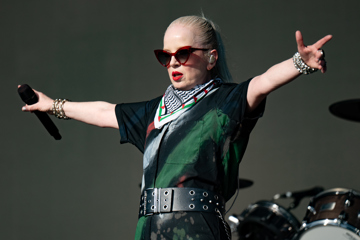Wright To Write
Tom Wreight explains why a new translation of Thomas Bernhard’s The Histrionic was necessary.
Our conversation begins with Sydney Theatre Company's associate artistic director Tom Wright reflecting on his role on the last leg of the European tour for Gross Und Klein, a production initially based on the vision of director Luc Bondy, Benedict Andrews taking the reins when complications that prevented Bondy from being in Australia, and one Wright describes as phenomenal, before adding, “In the end, remounting someone else's remount of someone else's work; it's just a job.”
There's nothing sour in Wright's reflection. It's more that, as will become increasingly clear during the rest of our discussion, Wright is well aware of his differing creative roles within the world of theatre. Some call for heavy-handedness, or a boldly stated intention, others not so much, though all serve a purpose and in no way are archaic ideas of 'authorship' or 'ownership' in theatre easily applicable.
One of Wright's most recent undertakings is a translation of Thomas Bernhard's darkly comedic play within a play, Der Theatermacher, or The Histrionic, which joins an impressive list of prior adaptations and translations that Wright has penned for Sydney Theatre Company. It's a list that includes Ovid's Metamorphoses, The Lost Echo, Shakespeare's The War Of The Roses, Euripides' The Women Of Troy and Aeschylus' Oresteia.
“Usually what I do is adaptation,” says Wright, alluding to the likes of Brecht's Baal, which he drastically reworked, alongside Simon Stone, for an STC production last year. “But in the case of The Histrionic, under the terms of our license, it has to be a literal translation, so I've pretty much followed it word for word, what Bernhard wrote. That's the terms of the estate and that's fine, it's completely reasonable.
Don't miss a beat with our FREE daily newsletter
“So in the case of this one it was more your traditional literary model where I sat down with my German grammar – it's written in Austrian, so every now and then you find an odd verbal construct or an odd noun – so fundamentally this one was more an act of trying to, as accurately as possible, refract and reflect Bernhard's world view and the text.”
With the Bernhard Estate putting some rather strict limitations on the text and how it is to be translated, one could ask why a new translation of Der Theatermacher was required, given there is an extant American academic translation of the play. Wright alludes to a philosophy that governs STC, and Malthouse Theatre, where this production of The Histrionic – under the direction of Daniel Schlusser and with Billie Brown in the lead role of Bruscon – premiered in Australia, as the impetus for translating the work anew.
“Both Malthouse in Melbourne and Sydney Theatre Company have a philosophy which we try to adhere to as much as possible, that when we do works from outside the English language we give opportunities to contemporary Australian writerly voices to find a way to reimagine it. The only other translation of Der Theatermacher that's published is an American academic translation, which uses terms like 'cookies' and things like that in it, and so by definition it feels like it's written from an American viewpoint. Were we to take that on we'd be engaging in a double act of cultural hegemony, whereas there is something to be said about, even within the constraints of a literal translation, the place and viewpoint from which a translator works. There's no such thing as pure translation, obviously; it doesn't matter whether you're translating Mandelshtam's poetry or whether you're trying to translate high-level prose like Robert Musil or you're trying to translate the free verse of Bernard's plays, the one thing you can never afford to pretend is that you are in some way invisible in the process. A translator is still a writer – and their ideological preconceptions and their cultural assumptions and the simple way they choose to insert adjectival clauses is in itself a political act.”
As a writer, then, and not just a translator, Wright set himself the task of creating a version of the script that was as robust as the character of the has-been star at the centre of the play. “I appreciate the delicacy. If you have to translate contemporary Japanese poetry it would be like being a brain surgeon, the degree of finesse required is extraordinary and merely syllabic rendering could keep you awake at night, but you have to create robust texts for theatre. You can't create fine texts.
“What rehearsal rooms tend to do is blunt the edges off texts and actors and directors tend to generalise where writers tend to be more specific. What you have to do when you're preparing a text that is designed to go into the rehearsal room is create a text that's simultaneously open to multiple interpretations but is also robust enough to withstand misinterpretation, and those two things are sometimes frustrating and sometimes very rewarding.”
The Histronic opens Friday 15 June until Saturday 28 July, Wharf 1, Sydney Theatre Company







